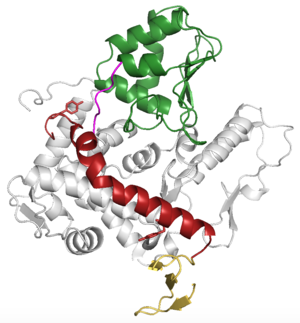WWP2
From Proteopedia
| Line 3: | Line 3: | ||
Should we link this page to 5tjq (2,3-linker)? It also has a proteopedia page. | Should we link this page to 5tjq (2,3-linker)? It also has a proteopedia page. | ||
==Introduction== | ==Introduction== | ||
| - | WWP2 is a type of [[ubiquitin protein ligase]]. More specifically, it is a member of the '''H'''omologous to the '''E'''6-AP '''C'''arboxyl '''T'''erminus | + | WWP2 is a type of [[ubiquitin protein ligase]]. More specifically, it is a member of the HECT ('''H'''omologous to the '''E'''6-AP '''C'''arboxyl '''T'''erminus) E3 Ligases class which accept a [[ubiquitin]] molecule from an enzyme upstream in the ubiquitination pathway and transfer the ubiquitin to a Lysine residue in the target signaling molecule or transcription factor. Ubiquitination can impact proteins in several different ways. Notably, it can serve as a signal for degradation, lead to translocation within the cell, and result in altered activity and altered protein-protein interactions. The thioester bond formation between an active site Cystine on HECT E3 Ligases and ubiquitin differentiates this family of enzymes from the more abundant RING ('''R'''eally '''I'''nteracting '''N'''ew '''G'''ene) family of ubiquitin ligases which mediate ubiquitin transfer through non-covalent interactions. Within HECT E3 Ligases, WWP2 falls into the NEDD 4 (neuronal precursor cell-expressed developmentally down regulated 4) family. NEDD4 E3 Ligases consist of an N-terminal C2 domain, between two and four WW domains, and a C-terminal HECT domain. |
==Structure== | ==Structure== | ||
Revision as of 18:57, 16 June 2020
Contents |
Thoughts & Notes
Should we link this page to 5tjq (2,3-linker)? It also has a proteopedia page.
Introduction
WWP2 is a type of ubiquitin protein ligase. More specifically, it is a member of the HECT (Homologous to the E6-AP Carboxyl Terminus) E3 Ligases class which accept a ubiquitin molecule from an enzyme upstream in the ubiquitination pathway and transfer the ubiquitin to a Lysine residue in the target signaling molecule or transcription factor. Ubiquitination can impact proteins in several different ways. Notably, it can serve as a signal for degradation, lead to translocation within the cell, and result in altered activity and altered protein-protein interactions. The thioester bond formation between an active site Cystine on HECT E3 Ligases and ubiquitin differentiates this family of enzymes from the more abundant RING (Really Interacting New Gene) family of ubiquitin ligases which mediate ubiquitin transfer through non-covalent interactions. Within HECT E3 Ligases, WWP2 falls into the NEDD 4 (neuronal precursor cell-expressed developmentally down regulated 4) family. NEDD4 E3 Ligases consist of an N-terminal C2 domain, between two and four WW domains, and a C-terminal HECT domain.
Structure
| |||||||||||
Function
Disease
Relevance
Structural highlights
References
1. A Tunable Brake for HECT Ubiquitin Ligases.,Chen Z, Jiang H, Xu W, Li X, Dempsey DR, Zhang X, Devreotes P, Wolberger C, Amzel LM, Gabelli SB, Cole PA Mol Cell. 2017 May 4;66(3):345-357.e6. doi: 10.1016/j.molcel.2017.03.020. PMID:2847587
Proteopedia Page Contributors and Editors (what is this?)
Tihitina Y Aytenfisu, Hannah Campbell, Sandra B. Gabelli, Michal Harel

